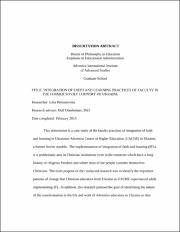| dc.contributor.author | Ponyatovska, Lilia | |
| dc.date.accessioned | 2020-11-05T01:35:07Z | |
| dc.date.available | 2020-11-05T01:35:07Z | |
| dc.date.issued | 2015-02 | |
| dc.identifier.uri | https://dspace.aiias.edu/xmlui/handle/20.500.12977/165 | |
| dc.description | Unpublished Dissertation (PhD Education)
Shelf Location: LC586.A3 .P65 2015 ATDC | en_US |
| dc.description.abstract | This dissertation is a case study of the faculty practices of integration of faith and learning in Ukrainian Adventist Center of Higher Education (UACHE) in Ukraine, a former Soviet republic. The implementation of integration of faith and learning (IFL) is a problematic area in Christian institutions even in the countries which have a long history of religious freedom and where most of the people consider themselves Christians. The main purpose of the conducted research was to identify the important patterns of change that Christian educators from Ukraine at UACHE experienced while implementing IFL. In addition, this research pursued the goal of identifying the nature of the transformation in the life and work of Adventist educators in Ukraine as they
changed from a secular to a biblical educational approach. Also, it was planned to present a model which would be helpful in the development of IFL.
It was found that the implementation of IFL at UACHE was heavily influenced by the former Soviet culture and is presently still at an early stage of development within a Christian culture. Administrators of UACHE were more inclined to implement IFL solely through non-verbal forms of communication for they still felt uncomfortable to implement it directly. Students, on the other hand, recognized both direct and indirect forms of communication as essential and vital to IFL. Teachers from UACHE who were considered the best examples in the implementation of IFL described how they went through a process of change in their worldview. This change in perspective brought changes to their teaching practices and their relationships with students. They started to connect their faith with teaching practices deliberately and self-directedly. The nature of changes stemmed from the teachers’ pre-philosophical formations and represented deep assumptions of the connection between faith and education. The decision-making process, together with the special facilitator of IFL, revealed the change from a mere theoretical understanding of IFL to the practical implementation of it. Moreover, it revealed the change from a secular understanding of Christian education to a biblical one. A growing faith through a process of maturation or spiritual formation in connection to the divine is a key point in the decision-making process regarding the practical implementation of IFL. The Development of Worldview Change Model was proposed as a facilitator tool which could be helpful when planning in-service programs and conducting clinical supervision. | en_US |
| dc.language.iso | en_US | en_US |
| dc.publisher | Adventist International Institute of Advanced Studies | en_US |
| dc.subject | Seventh-day Adventists -- Christian education. | en_US |
| dc.subject | Christian education -- Philosophy. | en_US |
| dc.subject | Christian education -- Ukraine. | en_US |
| dc.subject | Learning and scholarship -- Religious aspects -- Christianity. | en_US |
| dc.title | Integration of faith and learning practices of faculty in the former Soviet country of Ukraine | en_US |
| dc.type | Dissertation | en_US |

